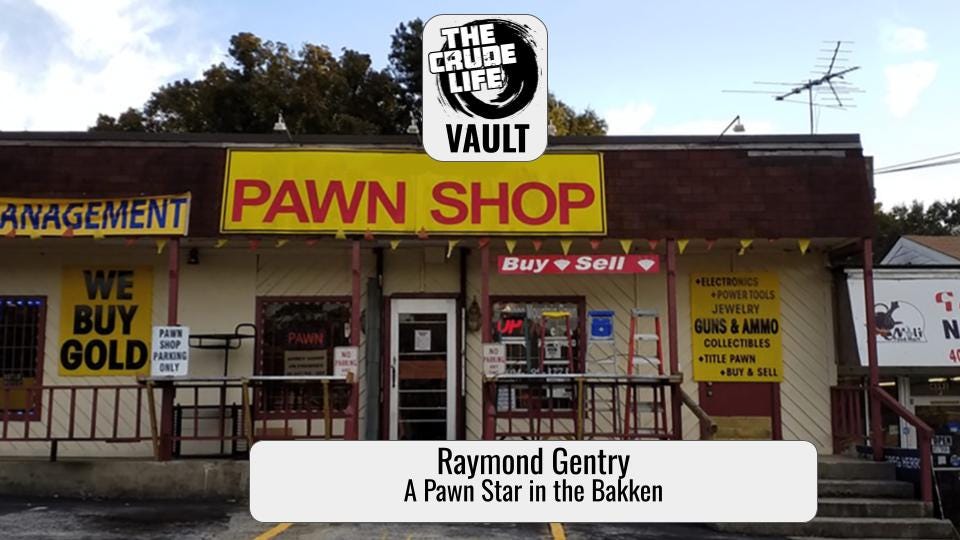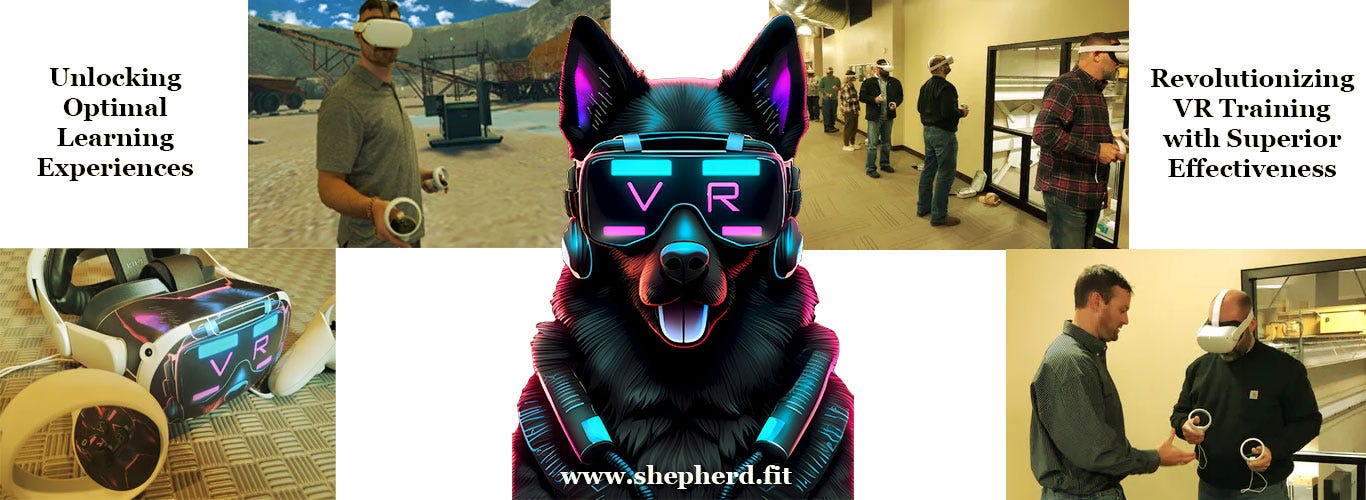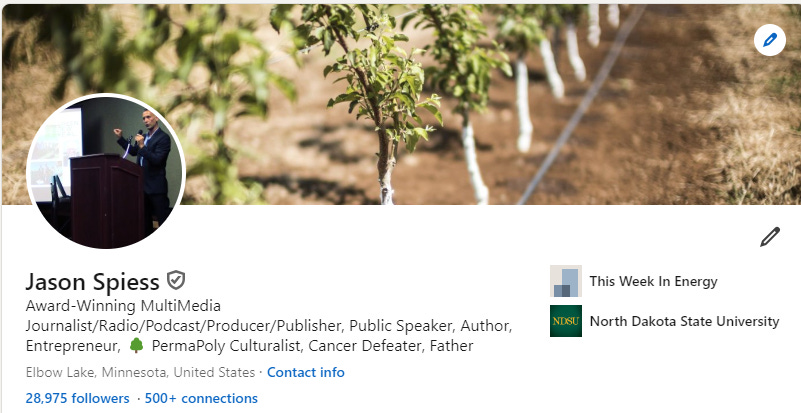Raymond Gentry is the Pawn Star of the Bakken. In this episode of The Crude Life Vault, Gentry talks about the boom and busts of Shale Play USA from a Pawn Brokers’ perspective. (Article and interview are from 2013.)
A new year often acts as a catalyst for individuals ushering in new beginnings – behavioral, physical or metaphorical. Health clubs, fortune tellers, blogs and checklists seem to be impacted early as the old habits go the way of the dodo. At least in theory. Those New Year businesses and services tend to wane as the days march on throughout the year. One industry that is often overlooked in the times of revival and purge is one whose roots date back to Ancient China. This merchant has been the fabric in many communities as the facilitator of used goods and the purveyor of last chances. The pawn shop.
Meet Raymond Gentry of Dakota Loan and Pawn. Gentry came to Dickinson in 1996 and says his business has been steady since 2002.
When asked about the effects the oil boom has had on his business, Gentry says, “Since the boom started, our business doubles every year.”
According to Gentry, there are many reasons for people utilizing his loan and pawn business. High paying oil jobs and low unemployment rates dominate headlines on the oil boom, but in fact, according to Gentry, he sees much more need for his business now than in the pre-boom era.
“Pre-oil boom the average North Dakotan and our economy has always been pretty steady so my business wasn’t utilized as much,” Gentry recalls.
The mechanics of a typical pawn transaction are pretty simple. A customer brings in an item and uses it as collateral to obtain a relatively small cash loan. The customer than has a fixed period of time in which he can return to pay off the loan with interest and retrieve the item. If the customer doesn’t pay off the loan, the item becomes the property of the pawnbroker, who then sells it in his retail shop.
Gentry notes that the influx of people into the state is bringing more people who are accustomed to utilizing pawn shops to get by.
“We probably have about an 80% redemption rate on our pawns. People come back in and do pick their items back up,” Gentry said. “Of course, there are those hard cases where people want their item back but something else comes up and it is more important or takes precedence over them getting the item back.”
Gentry continued saying he does his best to work with those hard luck cases, even if they “aren't items of sentimental value.”
Pawn Shops Today, which boasts being “The National Voice of the Pawn Industry,” claims the national redemption rate on pawn loans is around 80 percent.
When asked about the ratio of pawning vs. selling, Gentry said, “It’s about 70/30 with 70% pawn, 30% sales.”
Many of sales are associated with situations of a job transfer. For instance, a worker going from welding work to oil work might sell off his welding equipment to buy other industry tools. Likewise, people beginning a new trade may come in looking to get equipped. In that sense, the pawn broker serves a much needed service in the volatile job environment of an oil boom.
The other side of the boom that Gentry sees, are the folks who can’t strike the balance between cost of living, wages, and quality of life. It is a reminder that not everyone makes it out here and often comes with the realization that the effort to earn those wages comes at its own price.
“There are guys who have been coming up to the oil patch to work for say $25-an-hour, while they are paying $2000-a-month rent,” Gentry said. “After a year they sit back and say 'I can work at home for $15-an-hour and pay $500-a-month rent and I'll live just as good and be close to family.' So they'll cut back and go home after giving it a year’s go.”
Gentry said conversing with his customers is one of the perks of the jobs, finding out not only what brings them to the area, but what is keeping the professional nomads around.
“Some of the guys (coming into western ND) really just want to change their environment,” Gentry said. “North Dakota is beautiful country. If you come here and want a really nice place to live, North Dakota is a really good place.”
In addition to ag and oil, North Dakota has been a rural paradise for hunters, outdoorsman and gun rights enthusiasts. And in the pawn world, Gentry is quite accustomed to handguns, rifles and compound bows.
“Our sales have been quite steady. Usually, in the spring and late winter or end of summer, we will pick up and acquire a supply of guns. Then, when the hunting season comes around, we will diminish our guns down again,” Gentry said. “Hand guns have been a big seller, especially with the influx of people coming in. People are looking to protect their property more now, while our crime rates have changed dramatically over the past four years. It kinda all plays together.”
According to Stark County Sheriff Clarence Tuhy, the number of concealed weapon permits has increased in that same time from 188 to 927 in 2012. In 2005, there were 47 permits issued in Stark County.
In addition to the demand for guns matching the increased number of conceal carry permits in the state, Gentry has also felt the same effects on gun demand and ammunition as in the rest of the country.
Just two years ago, when the boom started to get traction, Gentry could barely keep non-lethal weapons such as tasers and pepper spray on the shelves. Now demand for non-lethal weapons has significantly tapered off in favor of handguns.
“Either everybody has them (non-lethal weapons) or they moved from pepper spray to a stun gun and then end up with a concealed weapon permit and a handgun which diminishes the demand for the stun gun or pepper spray.”
Being so close to I-94, Gentry sees many workers either coming from or going to the Bakken.
“I have had guys coming through from California and Washington who would come out here and didn't secure residency. No one explained to them the cost of living and a lot of the jobs out here want you to have a residence or a permanent place to live before they hire you,” Gentry said. “They get here and sleep in their truck or whatever and try to survive. They see they can't make it and wind up selling their construction tools or whatever just to get the gas money to get home.”
Common Tools Used (and Sold) in the Oil and Gas Industry
Tools and equipment specific to oil and gas operations often show up in pawn shops during layoffs, downturns, or shifts in demand. Here are some key items:
Pipe Wrenches and Tong Dies
Essential for oilfield maintenance and drilling, these are commonly pawned by rig workers.Torque Wrenches
Vital for ensuring proper pressure in oilfield applications.Hydraulic Tools
Used in heavy machinery maintenance, including hydraulic torque tools and hydraulic jacks.Safety Equipment
Includes hard hats, flame-resistant clothing (FR), gas detectors, and harnesses.Power Tools
High-quality brands like DeWalt or Milwaukee power tools are frequently used in the field.Welding Equipment
Welders, torches, and related tools are indispensable for pipeline work.Specialized Measuring Instruments
Items like calipers, micrometers, and pressure gauges may indicate oil and gas operations.
Recreational Items Reflecting Oil Workers' Prosperity
When the industry is booming, workers often pawn high-end recreational items either for extra cash during moves or splurge due to increased disposable income. Examples include:
ATVs and Snowmobiles
Popular among workers in remote areas like the Bakken Shale or Permian Basin.High-End Electronics
Gaming consoles, drones, and large-screen TVs often appear during profitable periods.Luxury Watches and Jewelry
Indicative of higher disposable incomes during a boom.Firearms and Hunting Gear
Reflecting hobbies common among oilfield workers.Sports and Outdoor Gear
Items like camping equipment, fishing rods, and kayaks are often seen when workers have extra money to spend.
(Article and interview are by Jason Spiess were published in 2013.)
Article by Jason Spiess. Spiess has over 40 years of media experience from being the host to the publisher to an editor to the executive producer to having principal ownership in several media companies. He has won multiple national awards from the newspaper, magazine and radio industry.
Spiess is currently the host of several newsmagazine radio podcasts that carry a 20-plus radio network, as well as worldwide through iHeart, Spotify and other podcast platforms. Spiess also operates a diverse professional social media audience with his media brands of over a combined 400K followers.
In addition to his newsmagazine radio podcasts, Spiess is a regular contributor to many industry publications, radio shows and traditional news websites.
Spiess is a full-time father, cancer survivor, environmental steward, author and graduate of North Dakota State University. Spiess also operates an off-the-grid office integrating sustainable solutions, including the best practices with an Industrial Forest and Digital Diversity.
Everyday your story is being told by someone. Who is telling your story? Who are you telling your story to?
Email your sustainable story ideas, professional press releases or petro-powered podcast submissions to thecontentcreationstudios(AT)gmail(DOT)com.
#thecrudelife promotes a culture of inclusion and respect through interviews, content creation, live events and partnerships that educate, enrich, and empower people to create a positive social environment for all, regardless of age, race, religion, sexual orientation, or physical or intellectual ability.
CLICK HERE FOR SPECIAL PARAMOUNT + DISCOUNT LINK
The Agency is an American espionage thriller television series for Showtime produced by George Clooney and Grant Heslov and starring Michael Fassbender. The series premiered on November 29, 2024, and is based on the critically acclaimed French series Le Bureau des Légendes, created by Éric Rochant, that aired on Canal+ from 2015 to 2020.
The Agency is now streaming on Paramount+





















Share this post